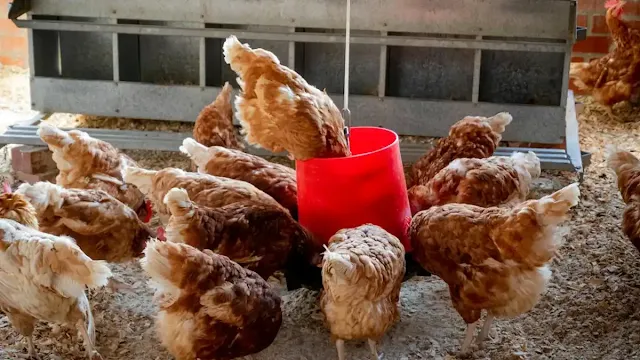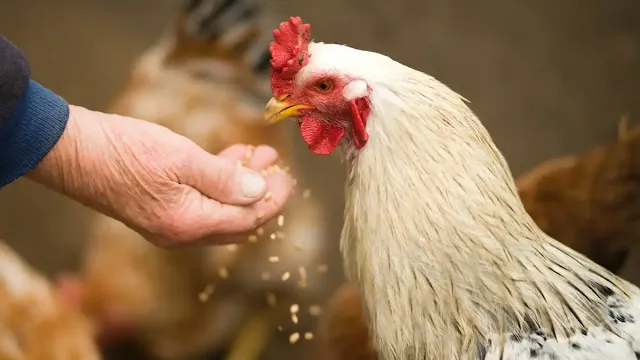The Best Chicken Breeds for Beginners and Their Characteristics
 |
| Best Chicken Breeds for Beginners |
What Breed of Chickens Are Best for Beginners?
Choosing the right breed of chickens can be a daunting task, especially for beginners embarking on their poultry journey. However, fret not, as I am here to guide you towards the perfect feathered companions that will make your chicken-keeping experience a breeze.
One of the top choices for beginners is the Rhode Island Red. These birds are known for their docile nature and hardy constitution, making them resilient in various climates. Additionally, they are excellent egg layers, consistently providing a steady supply of large brown eggs. Their friendly demeanor also makes them enjoyable to interact with, making them an ideal choice for families.
If you're looking for an all-around versatile breed, consider the Sussex chicken. Known for their calm and easy-going temperament, Sussex chickens are low-maintenance and adaptable to different environments. They come in various color varieties and are prolific egg layers, ensuring a plentiful supply of delicious eggs. With their gentle nature and striking appearance, Sussex chickens bring charm to any backyard flock.
Read Also About: What Chickens are most Friendly?
What breed of chicken is low maintenance?
When it comes to keeping chickens, many beginners are understandably concerned about the level of care and maintenance required. Fortunately, there are certain chicken breeds that are known for being low maintenance, making them perfect for novice poultry enthusiasts.
The Rhode Island Red is a popular choice among beginners due to its hardiness and adaptability. These birds are highly independent and require minimal attention. With their vibrant red feathers and excellent egg-laying abilities, they offer both aesthetic appeal and practicality.
Another low-maintenance breed is the Sussex chicken. These docile birds have a calm temperament, making them easy to handle and less likely to cause any trouble. They are also known for their resilience against various weather conditions, making them suitable for different climates.
Opting for low-maintenance chicken breeds not only eases the burden of care but also ensures a positive experience for beginners. With these breeds, you can focus on enjoying your feathered friends' company while reaping the rewards of fresh eggs without feeling overwhelmed by excessive demands.
 |
| The Best Chicken Breeds for Beginners |
Is it OK to mix chicken breeds?
Mixing chicken breeds can be an exciting venture for beginners, as it allows for an array of colors, sizes, and personalities within your flock. Not only does it add visual interest to your backyard, but it also promotes genetic diversity among the birds. However, there are a few important considerations when mixing chicken breeds.
Firstly, compatibility is crucial. Some chicken breeds have dominant or aggressive traits that may not mix well with other breeds. It's essential to research the temperaments and behaviors of different breeds before deciding which ones you want to keep together. By choosing compatible breeds, you can foster a harmonious and peaceful environment for your chickens.
Secondly, certain health issues can arise when mixing chicken breeds. Some breeds are more prone to specific diseases or genetic disorders than others. It's important to understand the potential health risks associated with each breed and ensure that they have proper care and nutrition to prevent any complications. Regular check-ups with a veterinarian experienced in poultry health can greatly assist in maintaining the well-being of mixed breed flocks.
Are chickens cheap to keep?
When considering the cost of keeping chickens, it is important to weigh the initial investment against the long-term benefits. While there are some upfront expenses such as purchasing a coop and fencing, these can be seen as valuable investments in creating a safe and comfortable home for your feathered friends. In terms of ongoing costs, the majority of a chicken's diet consists of grains and vegetables, which are relatively inexpensive compared to other livestock. Additionally, chickens have a remarkable ability to forage for bugs and weeds in your backyard, reducing their reliance on store-bought feed.
Furthermore, raising chickens can lead to substantial savings on grocery bills. Not only will you have fresh eggs at your disposal without having to purchase them from the supermarket, but you can also make use of their manure as fertilizer for your garden or compost heap. In this way, chickens contribute to a sustainable cycle of food production right in your own backyard.
While it is true that unexpected veterinary costs may arise from time to time, taking proactive measures such as maintaining proper hygiene and providing a balanced diet can greatly reduce these risks. Moreover, if you approach chicken keeping with care and diligence by conducting regular health checks and practicing preventive measures like vaccinations, you are likely to minimize any potential veterinary expenses.
Is it cheaper to raise chickens or buy eggs?
One of the key considerations for potential chicken owners is whether it is more cost-effective to raise chickens or simply purchase eggs from the store. While the initial investment in setting up a chicken coop and acquiring the necessary supplies can seem daunting, the long-term benefits can outweigh the costs.
When you raise your own chickens, you have full control over their diet and living conditions. This means you can provide them with high-quality feed and ensure they are kept healthy. Commercially produced eggs often come from chickens that are raised in cramped conditions and fed a less nutritious diet, which may impact the quality of the eggs.
In addition to potentially healthier eggs, raising chickens allows you to enjoy a sense of self-sufficiency and connection with your food. There is something fulfilling about gathering fresh eggs each morning from your own backyard flock. It also eliminates the need to rely on grocery store supply chains, giving you peace of mind knowing where your food comes from.
Are backyard chickens worth it?
Many people ponder the question of whether keeping backyard chickens is truly worth the effort, time, and resources. The answer is a resounding YES! There are numerous benefits that make raising chickens a worthwhile endeavor for beginners and seasoned poultry enthusiasts alike. Let's explore some of the reasons why having backyard chickens can be incredibly rewarding.
First and foremost, having a flock of your own feathered friends allows you to have a constant supply of fresh, nutritious eggs right at your doorstep. Not only are homegrown eggs incredibly tasty and versatile in the kitchen, but they also provide an unparalleled sense of satisfaction knowing exactly where your food comes from. Additionally, you can say goodbye to those grocery store runs for eggs, saving both money and time in the long run.
Furthermore, keeping backyard chickens promotes sustainable living and reduces your ecological footprint. Chickens are skilled insect hunters! They will happily feast on pesky bugs in your yard while simultaneously aerating and fertilizing the soil with their scratching behavior. This natural pest control not only eliminates the need for harmful chemicals but also contributes to a healthier garden ecosystem overall. You'll soon find yourself marveling at how these feathered companions effortlessly integrate into your sustainable lifestyle.
 |
| Are backyard chickens worth it |
How many chickens do I need for a dozen eggs a week?
For those who are interested in having a steady supply of fresh eggs, it is important to determine how many chickens are needed to meet the desired quantity. To obtain a dozen eggs per week, it is generally recommended to have around three to four hens in your flock. However, several factors should be taken into consideration when making this decision.
The first factor is the laying capacity of the chicken breed. Some breeds are known for their prolific egg-laying ability, while others may lay fewer eggs or have intermittent laying patterns. It is crucial to select breeds that are known for their consistent egg production, such as Rhode Island Reds, Sussex, or Leghorns.
Another factor to consider is the age of the hens. Typically, hens start laying eggs between five and six months old. During their first year of laying, they tend to produce more eggs compared to subsequent years. It's worth noting that as hens age, their egg production may decrease gradually.
To sum up, having three to four well-selected hens in your flock should provide you with an ample supply of fresh eggs throughout the week. Remember that proper nutrition and care play significant roles in ensuring optimal egg production from your feathered companions.
How many years will a chicken lay eggs?
One of the most common questions beginner chicken keepers have is how long their feathered friends will continue laying eggs. Understanding the lifespan of a chicken's egg-laying ability is crucial for planning and managing your flock effectively.
The average lifespan for a laying hen varies depending on several factors, including the breed, overall health, and living conditions. Generally, most chickens will start to lay eggs around 5 to 6 months of age and can continue laying consistently for about 2 to 3 years.
However, it's important to note that some breeds are known for greater longevity in egg production. Heritage breeds such as Rhode Island Reds or Sussex chickens can continue producing eggs well into their fourth or fifth year. By providing your hens with proper nutrition, a comfortable environment, and regular health check-ups, you can extend their productive years even further!
 |
| Can one chicken lay 2 eggs a day |
Can one chicken lay 2 eggs a day?
While it may seem like a delightful poultry fantasy to imagine a chicken laying two eggs in a single day, the reality is that it is highly unlikely. Chickens are creatures bound by nature's limitations, and their reproductive systems are designed to produce one egg per day. The process of egg formation requires considerable energy and resources, making it physically challenging for a hen to lay more than one egg in a 24-hour period.
It is crucial to understand that chickens are not machines designed solely for egg production. They have their own biological rhythms and cycles, which include the daily process of releasing an individual matured egg from their ovaries. Once an egg is laid, the hen's reproductive system begins preparing another follicle for future ovulation.
However, while it is improbable for a chicken to consistently lay two eggs in one day, there have been rare instances where hens have produced double-yolked eggs. These unusual occurrences happen when two yolks travel together through the oviduct and become enclosed within one shell. Double-yolked eggs can be seen as special treasures from your feathered friends, but they should not be expected as regular daily offerings.
Is it OK to mix chicken breeds?
As a beginner chicken keeper, you may wonder if it's acceptable to mix different breeds of chickens in your flock. The answer is a resounding yes! Mixing chicken breeds can actually have several benefits and can be a delightful experience for both you and your feathery companions.
Mixing chicken breeds not only adds visual interest to your flock, but it also promotes genetic diversity. By combining different breeds, you create a vibrant tapestry of colors, feather patterns, and unique characteristics. Moreover, mixing breeds often results in healthier chickens overall. Each breed brings its own set of strengths and weaknesses, which can balance out any potential health issues that may arise in purebred flocks.
When introducing new chickens to an existing flock, it's important to carefully manage the integration process. Provide sufficient space for each bird to establish its territory and avoid overcrowding, as this can lead to aggression. Observe their interactions closely at first and be prepared for some initial pecking order disputes as they establish their hierarchy. With patience and proper supervision, your mixed flock will thrive harmoniously.
 |
| Is it cheaper to raise chickens or buy eggs |
What is the minimum amount of chickens to keep together?
When it comes to keeping chickens, it's important to remember that these sociable creatures thrive in the company of their feathered friends. While you can technically keep a single chicken, it is highly recommended to have at least two or more chickens for their well-being and overall happiness.
Chickens are social animals that thrive on companionship and interaction. By keeping multiple chickens together, they can establish a pecking order and form strong bonds within the flock. This not only provides them with a sense of security but also encourages natural behaviors such as foraging, dust bathing, and roosting.
Furthermore, having multiple chickens can actually benefit you as a backyard chicken keeper. Not only will they provide each other with entertainment and mental stimulation, but they will also help control pests in your garden while fertilizing the soil with their droppings. So by keeping more than one chicken, you are creating a harmonious environment where these feathery friends can flourish.
 |
| FAQ Chickens |
Do you have ANY Questions about Chickens? Leave a reply on one of our FAQ Articles, and we will answer you within 24 hrs, or we create a FAQ Chicken Blog Post about your question!
You also can check out Boyd's BIG Feathers Farm YouTube Channel, for more Info about Chickens, Funny Chicken Videos, How to Raise Chickens the Successful Way, Tips & Tricks in DIY Backyard Chickens and other Homesteading Videos! - We hope to see you soon! ~ Boyd from BIG Feathers Farm!
